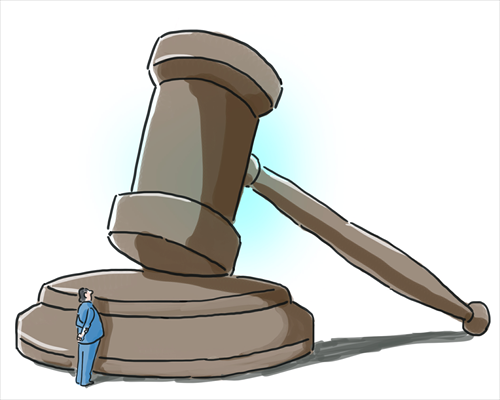Hong Kong protests damage rule of law

Illustration: Liu Rui/GT
On March 13, a mob injured the general manager of a watch and clock shop with a gun when robbing the shop in Tsim Sha Tsui in southern Kowloon of Hong Kong. Firearms incidents have been rare in the last 20 years. The full-blown anti-mainlander protests in recent weeks have scared away visitors planning to shop in Hong Kong but attracted gun-holding robbers.
This is not an isolated case but a reflection of some Hongkongers' ignorance of rule of law in recent years. The illegal Occupy Central movement and the anti-mainlander activism have offered robbers an opportunity of reckless looting.
Defiance of laws and regulations, like an evil simmering deep in the heart, comes as a consequence of the destruction of the rule of law in Hong Kong society as a whole and the malignant imitation of the notion of disobedience of the law not being equal to violation of the law. The ravaging of the spirit of rule of law will wield a massive negative influence upon public security.
In the Occupy Central movement from September to December 2014, Hong Kong students boycotted classes, hit the police and broke into Hong Kong government headquarters, paralyzing the transportation system of the Asian financial hub and disturbing the normal life of residents. But the protests also exerted a far worse impact on Hong Kong.
While the aftermath of the Occupy Central movement still lingers on, another round of "anti-locust" campaigns staged by Hongkongers disgruntled with the mass influx of mainland visitors has further fueled the anti-mainlander sentiment.
The violent conflict between demonstrators and tourists from the Chinese mainland at Tuen Mun's Trend Plaza in February ended up with a number of injuries.
In addition, the anti-mainlander protests, lasting for several weeks, are gaining momentum. The whole of Hong Kong society is tinged with violence, with murmurs of discontent being heard everywhere. The safety and harmony of the booming financial center seem to be fading away.
The absence of rule of law will inevitably jeopardize social safety and stability. In a well-governed and harmonious society, there is no chance for mean and wicked behavior to break out.
As a scholar once pointed out, violence is contagious, like injecting toxic bacteria or putrefactive cells into social environment, which will breed, multiply and finally lead to a disastrous consequence.
Violence has constantly been generating negative energy for Hong Kong society. According to departments concerned, Hong Kong's crime rates hit a new low during the first half of 2014 before the Occupy Central movement broke out.
However, owing to the unprecedentedly escalated tensions during the past few months, the city slipped to the 33rd place from the previous 17th in the global ranking of most livable cities, as revealed by a finding of the latest location ratings for expatriate living conditions published by consulting firm ECA International.
Andy Tsang Wai-hung, commissioner of the Hong Kong Police Force, said that there were more thefts in occupied areas during the movement and the number of such cases in Wan Chai rose four times in October compared to September.
Society needs positive energy to prevent violent incidents from bursting and spreading. Hong Kong has long been attractive to visitors and investors with an impeccable legal system and a fair economic landscape. A society ruled by law does not allow violence to radiate in a vicious cycle.
No reason should serve as a permit for violence. Motivations for violence can be nipped in the bud only through proper prevention. Therefore, violence in all manifestations must be firmly curbed to uphold the rule of law in Hong Kong.
The author is a Hongkonger with two master's degrees in economics and sociology. opinion@globaltimes.com.cn